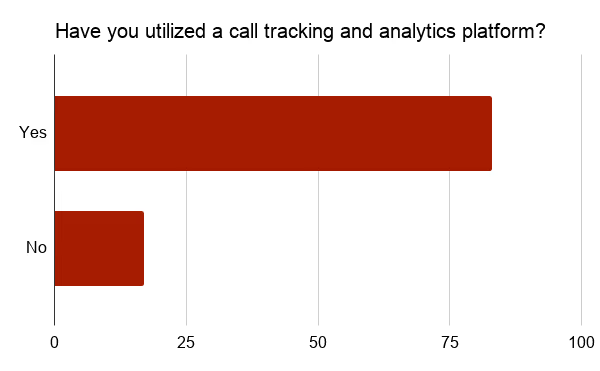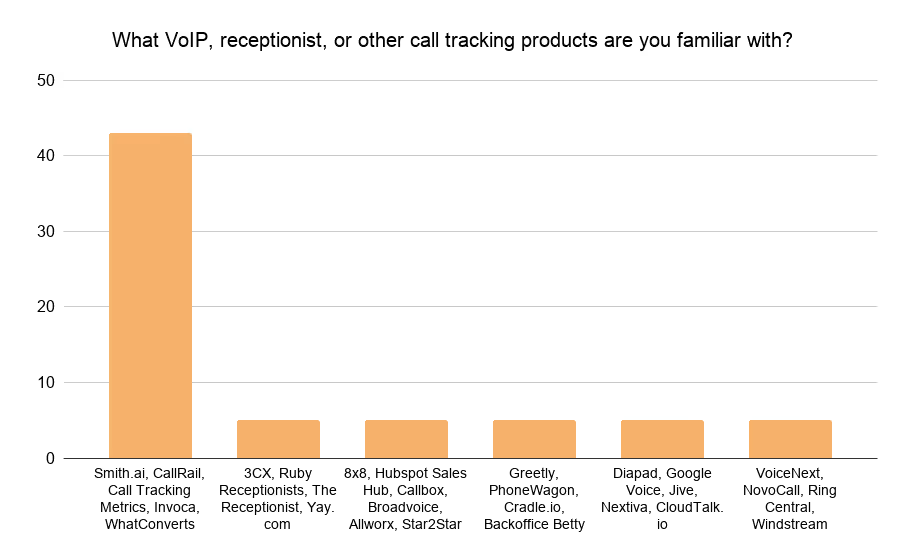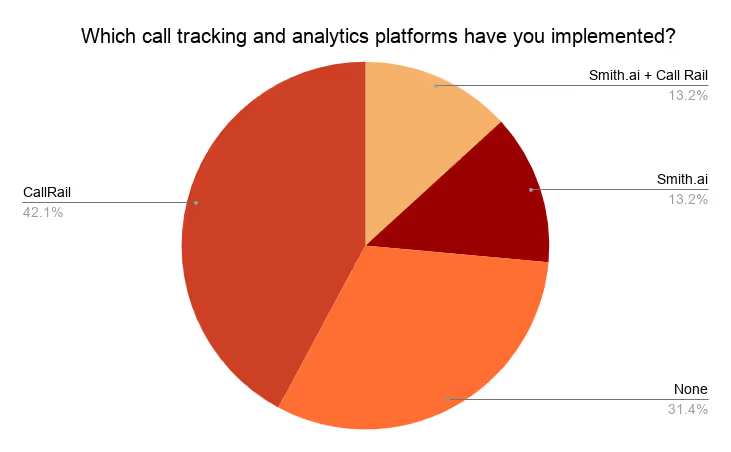Voice Services Snapshot, Part 2: Call Tracking and Analytics
Voice Services Snapshot, Part 2: Call Tracking and Analytics

In the previous blog post in our series, we covered the importance of answering calls quickly and efficiently through reliable call answering services. Now, we’re focusing on how businesses can leverage the data they receive from phone calls to improve their operations and increase sales. While talking with new and existing clients is crucial for maintaining a functioning business, understanding how, when, and why clients call can mean the difference between surviving and thriving for any business.
Call tracking and analysis enables businesses to see the value in advertising and marketing and make improvements to bring in more leads and close more sales. But not all call tracking platforms are made equally. Through the results of our survey, we’ll take a look at the ways in which businesses are tracking and analyzing calls, as well as what they’re gaining from it. A few of our marketing experts will weigh in with their thoughts on the importance of call tracking and how businesses can utilize it to improve customer service, boost lead conversion, and much more.
1. How important is implementing call tracking and analytics to growth? How well are most businesses doing it?
Measuring the calls you make and receive can make a huge difference in the way you go about doing business. By tracking and analyzing calls, businesses can understand what part of marketing and lead conversion is working, and what can be improved upon. According to our survey, over 83% of respondents utilized a call tracking and analytics platform.

While a majority of our respondents found call tracking platforms valuable enough to utilize regularly, not every business professional realizes their importance. Without tracking and analyzing call data, they risk providing inadequate services to their clients and are vulnerable to lost growth and missed lead capturing opportunities.
As one of the many respondents who does utilize a call tracking and analytics platform, Matt Burke, CEO of ZillaMetrics, emphasizes why tracking calls is crucial for their clients and their own agency. “Tracking leads is incredibly important for our SMB clients," says Burke. "We want them to understand how their marketing is working and show the performance of our services. Clients who have previously trusted another provider with their marketing end up with no call data, and therefore no clear picture of what worked and what didn't. Either their tracking system had issues or it wasn’t set up at all.”
While tracking and analyzing calls is important, what might be arguably more important is tracking and analyzing calls correctly. Performing inadequate tracking or outsourcing call tracking to an unreliable provider can lead to inaccurate data that drives bad decisions. Knowing what metrics to measure and how to measure them properly is the only way to ensure that the data obtained from calls is accurate. That way, businesses and agencies can trust the data and use it to make informed decisions that lead to success and better business growth.
2. What metrics are most important when measuring calls?
When measuring calls, there are an overwhelming amount of metrics that a business can analyze, depending on their call tracking goals. These can range from length of inbound calls and average response times to first contact resolution and the percentage of first-time callers. Some metrics, however, have proven to be vital for all businesses to evaluate when tracking and analyzing their calls.
Lead conversion/sales is the most important metrics for any business to measure.
Measuring the amount of leads that are converted into customers and the revenue from those sales shows you how successful your business is at any given time, though this is common knowledge for most every business owner.
Another metric that all businesses should measure, according to Matt Burke, is response time. “If we are going beyond tracking leads and calls, the next metric that’s important to measure is time to respond; basically, how quickly are phone calls answered, and how many phone calls are going to voicemail?”
While there are a few general metrics, such as the amount of calls received, that are important for most businesses to measure, your metrics should always reflect your specific business’s standards, your customers’ expectations, and your team’s abilities. For example, a digital marketing agency might want to measure call source to trace their online visibility and the success of their marketing while a retail company might want to measure call abandonment rate to evaluate their ability to reach new leads as well as the overall quality of their customer service. Choosing what to measure wisely is crucial to receiving data that is valuable and applicable for your business.
Making sure that your metrics are useful for your business, however, is only half the journey. To ensure that your business will be able to consistently and reliably track and analyze calls, you’ll need a trustworthy call tracking service.
When deciding which platform to outsource call tracking to, it’s important to consider how well the platform measures that which you find valuable. What good is a certain metric if it is measured poorly? Choosing a call tracking and analytics platform that is not only reliable, but also effective, will enable your business to get the most out of your call tracking.
3. Which call tracking and analytics platforms are the most effective and why?
When choosing a call tracking and analytics platform, it’s crucial to consider all options and pick the platform that not only is the most well-known amongst other businesses in your industry, but is the most effective at call tracking and providing accurate analytics. Businesses should choose a call tracking platform carefully to improve their lead intake process without risk. But what should they look for outside of reliability and efficiency?
When choosing a platform, Matt Burke looks first for whether leads can be attributed effectively to certain marketing campaigns. “We use CallRail with every one of our clients because of its ability to track leads and attribution.” Burke says. “With CallRail we know how many leads are coming from Google My Business, Google Ads, organic search results, and so on. This is how we gauge success and report to our clients. Of course, rankings and organic traffic are important, but at the end of the day, the real KPI is revenue. It’s important that we measure our agency’s contribution to the client’s revenue, which is the number of leads and the number of qualified leads we send them.”
According to our survey, an even amount of respondents (5%) were familiar with outsourced call tracking and analytics using these providers: 3CX, Ruby Receptionists, Greetly, The Receptionist, 8x8, HubSpot Sales Hub, Callbox, PhoneWagon, Cradle.io, Dialpad, Google Voice, Jive, Nextiva, VoiceNext, NovoCall, RingCentral, Broadvoice, Back Office Betties, CloudTalk.io, Star2Star, Allworx, Windstream, and Yay.com.
Surprisingly, however, 43% of respondents said they were ONLY familiar with these tools: Smith.ai, CallRail, Call Tracking Metrics, Invoca, and WhatConverts.

Knowing the most popular call tracking platforms can help businesses determine which platforms are trustworthy and useful. Outsourcing call tracking and analytics to a reliable and proficient platform that has consistently provided quality services to businesses in your industry can make all the difference in your business’s ability to successfully attain and attract customers.
4. How do call tracking and analytics platforms improve business operations and customer satisfaction?
These platforms are generally designed to help businesses understand the ROI and value of incoming calls (whether answered by the business itself or a call answering service). They do this by focusing on the number of callers that convert to leads and which marketing campaign they can be attributed to. In addition, the metrics provided by these call tracking platforms can also significantly help to improve internal operations and customer service.
Matt Burke offers two interesting use cases. “One: tracking can help you understand when call volume peaks and how quickly calls are being answered, which helps manage resources and scheduling. Two: having the ability to record calls and play past calls is helpful for training and gauging inbound lead quality.”
Call tracking and analytics platforms are only useful if calls are actually being answered.
Businesses who use a reliable answering service can provide clients and leads with 24/7 live customer service and lead response, both on the phone and online. Answering every call quickly and professionally relates directly to better data on calls, allowing businesses to use call tracking and analytics to the fullest effect. Better quality control also leads to high performance and satisfied customers. Without answering every call, businesses are practically guaranteed to suffer, even with the best tracking software.
Allowing a professional and trustworthy call answering service to answer every call on the business’ behalf allows owners to build a solid foundation for their business in order to generate more leads, make more sales, and receive consistently dependable and valuable call tracking data.
Utilizing call tracking and analytics platforms as well as a reliable answering service, such as Smith.ai, can guarantee that your customers receive the best support possible and your business has all the information it needs to continue to maintain client relationships, attract new leads, and receive quality call tracking data.
In our survey, 26.4% of respondents said they use Smith.ai. Over 13% of respondents answered that they used Smith.ai to track calls and perform analytics, while another 13% of respondents answered that they used Smith.ai as well as a call tracking platform such as CallRail.com. By using Smith.ai, these respondents are able to track and prioritize quality control, improving client satisfaction, lead generation, and overall business success.

Tracking and analyzing calls is the key that helps businesses unlock countless doors to opportunity for growth. Utilizing a reliable call tracking and analytics platforms can enable businesses to gauge the success of their customer service, sales funnels, and intake processes. Additionally, businesses can improve in certain areas of their operations to ensure continued growth, lead conversion, and client satisfaction.
Efficiently tracking calls is guaranteed to help businesses evaluate the effectiveness of their operations and uncover opportunities for growth. However, to maintain quality, outsourcing to a call answering service is recommended, as it makes call tracking and analytics easier. If you’re looking for a way to answer and track calls quickly and efficiently, why not try out Smith.ai risk-free, with our 30-day money-back guarantee?
Take the faster path to growth. Get Smith.ai today.
Key Areas to Explore

Your submission has been received!














.svg)



